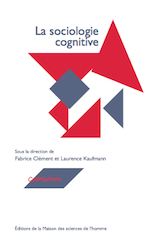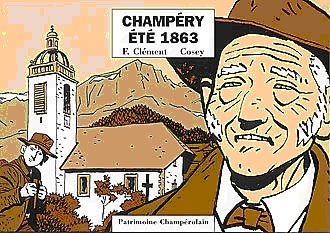
 |
Les mécanismes de la crédulité (The Mechanisms of Credulity), Paris / Genève, Éd. Droz, 2006.
Credulity is a rather common phenomenon that is nonetheless very difficult to explain scientifically. How can it be possible to take something as true while it is literally unbelievable? This book first sets out the common explanations in philosophy, social psychology and anthropology before exploring new research leads. Fabrice Clément offers the hypothesis that, under certain conditions, the very same mechanisms that were selected through evolution for providing reliable representations, work in a way that lead us to accept representations that should normally have been rejected. Once the foundations of the new model have been laid, some examples are examined: advertising, belief in extraterrestrial abductions, and religious cults. 
Le monde selon John Searle (The World according to John Searle), Paris, Éd. du Cerf, 2005. John Searle is recognized as one of the greatest contemporary philosophers. Following an original intellectual trajectory, he developed ingenious analytical concepts whose impact goes far beyond the philosophical field, their purpose being to integrate language, mind and society into a unique naturalistic framework. Until now, no single book offered to guide the curious reader through this rather complex system. Le monde selon John Searle tries to bridge this gap in introducing and illustrating with simple words the conceptual architecture and the issues of his works. But this is not just an introductory book: Laurence Kaufmann and Fabrice Clément also offer a critical analysis of a radically individualistic thinking which conceives cultural institutions and social relationhips as optional tools. 
Culture and Cognition. Towards a new dialogue between social and cognitive sciences (with L.Kaufmann), Intellectica (to be published in 2006). For a long time, social and cognitive scientists have been going their own way, not really wondering what each others were working on. This mutual indifference has its origin in Dilthey's distinction between Natur- and Geistewissenschaften, the former being marked by the discoveries of explanatory physical mechanisms, the latter by hermeneutic comprehension of historical phenomena. Such a division of scientific labor is still very perceptible in the disciplinary organization of the academic world. On one side, social sciences emphasize the specificity of cultural traditions and institutions, and the difficulty of translation between different forms of life. From this “top-down” perspective, cognition is usually left aside: the mind is essentially seen as a cultural construction that is framed all the way through the process of socialization. On the other side, cognitive sciences tend to focus on individual psychological processes, considering the subject as a scientist making sense of his environment all by himself. According to this “bottom-up” conception, cognitive processes are considered as natural, universal mechanisms for detecting and processing information. These invariant cognitive commonalities are held for causally responsible for the dissemination of certain representations that, once largely spread throughout a given population, become cultural. The goal of this issue of Intellectica is to show how recent works emerging from both paradigms are about to transform these unproductive dichotomies. These researches — coming from disciplines as diverse as developmental psychology, Gestalt psychology, social psychology, anthropology, cognitive sociology or ethology — have in common the project to avoid a priori ontological stances by insisting on observations, experiments or experiences that can all be considered as naturalist ic without necessarily being physicalistic or mentalistic. For instance, the rigorous application of the phenomenological method by some tenants of a cultural constructivist view of the mind favors a description of the process by which cultural forms are incorporated into the experiential, perceptual and action fields. On the other hand, cognitivists are rediscovering, notably through comparative researches, that fundamental cognitive processes (perception, attention, categorization) might be culture-dependent. The lowest common denominator of the diverse contributions of this issue of Intellectica could be the concept of competence. Actually, the constitution and the reproduction of culture require from individuals a certain range of competences, whether perceptual, attentional, mimetic, semiotic or representational. Investigating those competences is essential for those who want to account for the way cultural forms shape our cognitive stance towards our environment as well as for those who prefer to dwell on common acquisition processes and mechanisms. Contents (the order of contributions is provisory; when titles are followed by a “*”, it means that the title is just an rough indication of the content) : • Nisbett, R. & Masuda, T. « Culture and point of view » • Engel, P. « Cultures and Thought » • Harris, P. L. & Koenig, M. « Imagination and testimony in cognitive development: The Cautious Disciple? » • Zlatev, J. « The emergence of social meaning » • Servais, V. « Can we speak of animal culture ?» • Tomasello M. & Rakoczy H. « What makes human cognition unique? From individual to shared to collective intentionality » • Jacob, P. « Neurons mirrors and social cognition » • Brassac, C. « The historicity of human behavior » • Valsiner, C. « What cultural psychology teaches us » • Astuti, R. «Constraints on conceptual development» • Guillo, D. « A critical review of memetics » • Hirschfeld, L. « The cognitive foundations of culture » • Conein, B. « Distributed cognition and culture » • Kaufmann, L. & Clément, F. « Analogies and the origin of culture » • Quéré, L. « How to be a good naturalist in social sciences » 
(Eds) La sociologie cognitive (with L. Kaufmann), Paris: Orphys/Maison des Sciences de l'Homme (2011). More and more sociologists admit that their discipline cannot continue to ignore the development of Cognitive Science. However, they are far from reaching a consensus when they try to define what could be a cognitive sociology. This book proposes a critical overview of the different ways social and cognitive sciences could benefit from each other. With chapters by Raymond Boudon, Gerard Bronner, Aaron Cicourel, Fabrice Clément, Bernard Conein, Asia Friedman, Christophe Heintz, Bernard Lahire, Cyril Lemieux, Patrick Pharo and Louis Quéré. Champéry, Eté 1863, Martigny, Presses du Centre Rhodanien, 2004. This book offers to take up the following challenge: how to “unfold” a local culture and history, in a colorful and gripping way, all within a restricted spatiotemporal dimension? The solution adopted was that of a comic strip (book). Through a scenario created by Fabrice Clément and drawings from the famous illustrator Cosey, who shows great artistic and documentary talent, a whole world long disappeared comes back to life. The story itself contains a lot of information about the way inhabitants from the Val d’Illiez used to live. Thanks to Gustin, the main character, born around 1780, who was a smuggler and a Napoleonic mercenary, we discover a lot of what we know from the Champéry of the past. The novel is supplemented by a series of informative commentaries written by Fabrice Clément. 
|
|